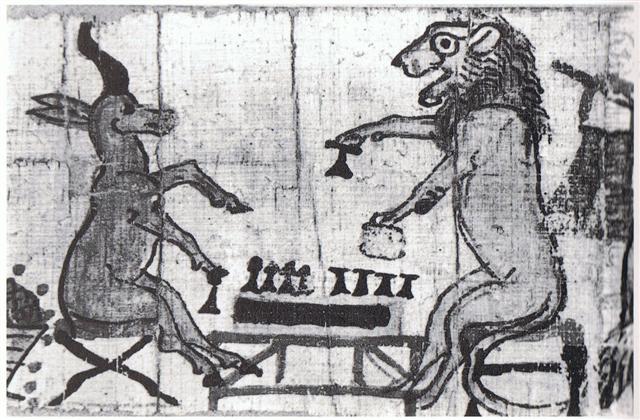Bb7.4
After the first 3 'transition days' in line Bb7
 |
 |
 |
|
Bb7-1
(244
→
300 - 56) |
Bb7-2
(666
→
722 - 56) |
Bb7-3
(273 + 365 + 29) |
|
Ku rere mai ki te manu |
e tagata hakanaganaga ia
ra |
mai tae moe |
|
Tae. 1. Negation used
in conditional and temporal clauses: ana
ta'e hoa te ûa, ina he vai, when it does
not rain, there is no water. Also used with
some verbal forms such as: o te aha koe
i-ta'e-oho mai-ai? why didn't you come?
Otherwise its use is limited to adjectives
or verbal adjectives: tagata ta'e
hupehupe, person who is not weak, hard
worker; nohoga ta'e oti, endless
existence, eternity. 2. Interjection
expressing admiration, always used with
he: ta'e he tagata! what a man!
Ta'e he aga! what a great job!
Ta'e he tagata koe mo keukeu i te henua!
what a good farmer you are! Vanaga. 1.
Prepositive negative: without, not, none. PS
To.: tae, prepositive negative. 2. To
remain; tae atu ki, as far as, until.
Taehaga (tae 1), to shake the
head in sign of negation, reluctant, to
disdain, to be displeased. 3. Pau.: tae,
to arrive. Mgv.: tae, id. Ta.: tae,
id. Ma.: tae, id. 4. Pau.: taetae,
elephantiasis in scroto. Ta.: taetae,
ill, illness. Churchill.
Mai. 1. From, since;
mai aganirá pemu'a from now on. 2.
Before, prior to (referring to a future
event certain to occur); mai ta'e oho au
ki-Hiva, prior to my leaving for the
continent (note the use of the negative,
lit. 'before I do not go...'. 3. Short for
ka-avai-mai, mai te kahu, give
me the dress. 4. Hither (movement towards
the speaker); ka-ho-mai (=
ka-oho-mai), come here! welcome!
hoki-mai-á e îa, he has come back;
ina kai garo'a-mai, he cannot understand
it; ka-to'o-mai, come and get it.
Vanaga.
Moe.
To sleep, to lie at full length, to
dream, to brood, to place, to cohabit;
moe atu, to leave off, to desist; moe
atu ra, to adjourn, to postpone; moe
hakahepo, to talk in the deep; moe
aherepo, somnambulist, sleepwalker;
moe hakataha, to sleep on the
side; moe no, to oversleep,
concubinage; moe tahae, to be a light
sleeper; moe tahaga, a
sleeper; moe vaeahatu, moe hakaroa,
to sleep sprawling; rava moe, to
sleep sound; ariga moe ki raro,
to lie flat on the ground; tae moe,
bachelor; hakamoe, to brood, to fold
the wings; to reserve, to lay up; to
struggle. P Pau.: moe, sleep. Mgv.:
moe, sleep, to lie down, coitus, to
shut the eyes. Mq.: moe, to sleep, to
lie down; haámoe, to set down on the
ground. Ta.: moe, to sleep, to lie
down. Moea raruga, lying flat.
Moeaivi, thin. Mq.: ivi,
haáivi, id. Ta.: ivi, id.
Moega, mat. Pau.: moehega, bed.
Mgv.: moega, a sleeping mat. Mq.:
moena, moeka, mat, floor cloth,
bed. Ta.: moea, bed. Moemata,
to sleep with the eyes open; mea moemata,
phantom. Moemoea, a dream, vision;
tikeahaga moemoea, apparition by
night. T Mgv., Mq., Ta.: moemoea,
dream. Churchill. Mgv. Moemoe, to
steal, to purloin at a food distribution.
Mq.: moemoe, to seize, to grasp.
Churchill. Ta.: 1. Moemoe, ambush.
Ha.: moemoe, id. 2. Moemoe,
Phyllanthus simplex. To.: mohemohe, a
tree. Churchill. Mq.: Moehu, exiled,
banished, prisoner of war. Ma.: morehu,
a survivor. Churchill. |
|
March 30
(454) |
31 |
April 1
(456 = 365 + 91) |
|
"May 8
(48) |
9 |
10 (50 =
91 - 41) |
|
JAN 25 (390) |
26 |
27 (392 =
91 - 64) |
|
HELIACAL STARS: |
|
ξ
Phoenicis (9.0),
ρ
Tucanae (9.1),
DENEB KAITOS (Tail of the Sea Beast) =
β
Ceti,
η
Phoenicis (9.4), AL NITHĀM (String of
Pearls) =
φ¹
Ceti
(9.6)
*9.4 - *41.4 = *150.0 - 182.0 =
- *32.0 |
ACHIRD (Woman with Luminous Rays) =
η
Cassiopeiae
(10.7) |
Legs-15 (Wolf)
ν
Andromedae (11.0),
φ²
Ceti (11.1),
ρ
Phoenicis (11.2),
η
Andromedae (11.4)
*335.0 = *11.4 - *41.4 |
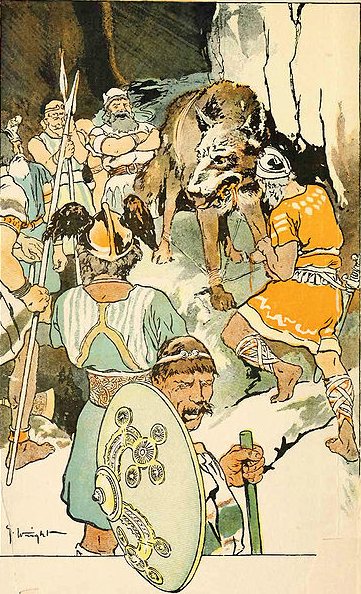 |
|
RIGHT
ASCENSION DAYS AT THE FULL MOON: |
|
Sept 28
(271) → 728 = 2 * 364 |
29 (272 =
2 * 136) |
30 (3 *
91) |
|
"Aug 18 (230 = 271 - 41) |
19 |
20 |
|
JULY 26 (207 = 271 - 64) |
27 |
28 |
|
Al Áwwā'-11 (The
Barker) /
Shur-mahrū-shirū-18
(Front or West Shur)
SOMBRERO GALAXY = M104 Virginis
(191.1),
ρ
Virginis (191.4),
PORRIMA =
γ
Virginis,
γ
Centauri (191.5)
*150.0 = *191.4 - *41.4 |
ι Crucis (192.2), β Muscae (192.5),
MIMOSA = β Crucis
(192.9) |
No star listed (193) |
|
272 (September 29) - 64
(precessional depth down from the Fishes to
the Bull) = 208 (JULY 27) = 181 (SIRIUS) +
27 ('thrice nine hallowed days').
... As has already been
mentioned, the Delphians worshipped Dionysus
once a year as the new-born child,
Liknites, 'the Child in the Harvest
Basket', which was a shovel-shaped basket of
rush and osier used as a harvest basket, a
cradle, a manger, and a winnowing-fan for
tossing the grain up into the air against
the wind, to separate it from the chaff. The
worship of the Divine Child was established
in Minoan Crete, its most famous early home
in Europe. In 1903, on the site of the
temple of Dictaean Zeues - the Zeus who was
yearly born in Rhea's cave at Dicte near
Cnossos, where Pythagoras spent 'thrice nine
hallowed days' of his initiation - was found
a Greek hymn which seems to preserve the
original Minoan formula in which the
gypsum-powdered, sword-dancing Curetes, or
tutors, saluted the Child at his birthday
feast. In it he is hailed as 'the Cronian
one' who comes yearly to Dicte mounted on a
sow and escorted by a spirit-throng, and
begged for peace and plenty as a reward for
their joyful leaps ...
 |
there follows another triplet centered around a
vertical opening, presumably corresponding to
how sky and earth here were forced apart:
... They were Ranginui,
the Sky Father, and Papatuanuku, the
Earth Mother, both sealed together in a close
embrace. Crushed between the weight of their
bodies were their many children, whose
oppression deepened. They yearned to be free;
they fought their parents and each other to
break loose. Tuumatauenga, virile god of
war, thrust and shouted; Tangaroa of the
oceans whirled and surged; Tawhirirangimaatea,
Haumiatiketike and Rongomatane, of
wild foods and cultivated crops, tried their
best but were not successful; and Ruamoko,
god of earthquakes, yet to be born, struggled in
the confinement of his mother's womb ... Of them
all, Taane Mahuta, the god of the
forests, was the most determined; he set his
sturdy feet upon his father's chest, and braced
his upper back and shoulders against the bosom
of his mother. He pushed; and they parted. So
the world, as the Maori understand it, came into
being ...
 |
 |
 |
|
Bb7-4 (13 * 19) |
Bb7-5 (248) |
Bb7-6 (670 = 664 + 6) |
|
ki te maro -
ku hokohuki ia - ki te tagata |
mai tae oho
atu ki te rima - o to haga mama ia -
ku hakatepe ia |
ki to maitaki |
|
Atu. Particle
of meaning opposite to that of
mai; it refers to the second or
third person, expressing movement
away: ka-avai-atu, give it to
him: he-oho-atu au, I am
going there, after you;
i-oho-atu-era, when I had gone
there. Vanaga. 1. a. Directive, of
motion from the speaker. b. Somewhat
expressive of the comparative
degree. 2. Pupil; hakaatu,
proof; hare hakaatuga,
schoolhouse, class. 3. (hakaatu),
to presage. 4. (hakaatu),
mark, object. Churchill.
Mama. 1. To chew. 2. To
mouth-feed (arch.) he-mama i te
vai tôa koia ko te tiapito kiroto ki
te haha o te poki, she
mouth-feeds the child with sugarcane
juice together with tiapito
juice. 3. A sea mollusc (with an
eight-horned shell). Vanaga. 1. To
leak, to ooze, (maamaa). P
Pau., Mgv., Ta.: mama, id. 2.
To chew. P Mgv., Mq., Ta.: mama,
id. 3. Light not heavy, (maamaa).
P Mgv., Ta.: mama, id. 4. A
limpet (Chiton magnificus).
Mgv., Mq., mama, a shellfish.
5. To open the mouth; hakamama,
to yawn, to gape, to be ajar. Pau.:
hamama, to open. Mgv.:
akamama, to burst open. Ta.:
haamama, to open. Mq.:
haámama, to open the mouth. 6.
Ta.: mama-orero, conclusion
of a council. Ha.: mama, to
finish, to have done with a thing.
Churchill. Kahu.
Clothing, dress, habit, cloth,
curtain, vestment, veil, shirt,
sheet; kahu hakaviri, shroud;
kahu nui, gown; rima o te
kahu, sleeve; kahu rahirahi,
muslin; hare kahi, tent;
horega kahu, shirt;
hakarivariva ki te kahu, toilet;
rakai ki te kahu, toilet;
patu ki te kahu, to undress;
kahu oruga, royal sail; kahu
hakatepetepe, jib; kahu nui,
foresail; hakatopa ki te kahu,
to set sail; (hecki keho,
canvas T.) P Pau.: kahu,
dress, garment, native cloth. Mgv.:
kahu, cloth, stuff, garment,
clothing. Mq.: kahu, habit,
vestment, stuff, tunic. Ta.: ahu,
cloth in general, vestment, mantle.
Chuchill. |
|
HELIACAL STARS: |
|
April 2 |
3
(29 + 64) |
4 |
|
JAN 28 |
29 (13 + 16) |
|
|
CIH (Whip)
= γ Cassiopeiae, λ Tucanae (12.4), φ³ Ceti (12.6), μ Andromedae (12.8)
*336.0 = *12.4 - *41.4 = 4 * 84 |
φ4 Ceti (13.2) |
No star listed (14) |
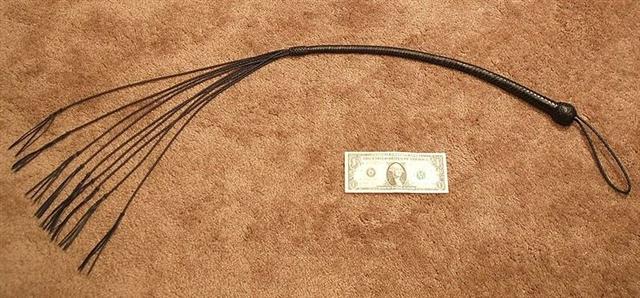 |
|
RIGHT
ASCENSION DAYS AT THE FULL MOON: |
|
Oct 1 (640 - 366) |
2
(275 = 93 + 182) |
3 |
|
JULY 29 (210 = 179 + 31) |
30 |
31 (29 + 183) |
|
κ
Crucis (194.4),
ψ
Virginis (194.5),
μ
Crucis,
λ
Crucis (194.6),
ALIOTH (Fat Tail) =
ε
Ursae Majoris,
ι
Oct.
(194.8)
*153.0 = *194.4 - *41.4 = 17 * 9 |
MIN-EL-AUVA
(Door of the Barker) =
δ
Virginis
(195.1),
COR CAROLI =
α
Canum Ven.
(195.3) |
δ
Muscae (196.5) ,
VINDEMIATRIX (Grape Gatherer) =
ε
Virginis
(196.8) |
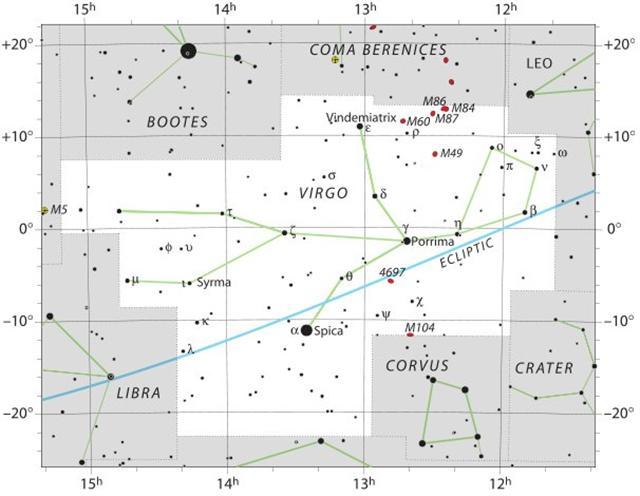
... The medieval names Auva, Al
Awwa, and Minelauva are from the Arabic, meaning
'barking (dog)'. This star, along with β Vir (Zavijava),
γ Vir (Porrima), η Vir (Zaniah) and ε
Vir (Vindemiatrix), were Al
Awwā, the Barker. On Euphrates it was Lu Lim,
the Gazelle, Goat, or Stag, - or perhaps King; and,
with ε, probably
Mas-tab-ba,
another of the seven pairs of Twin-stars of that
country. The
Hindus called it Āpa,
or Āpas,
the Waters; and the Chinese, Tsze Seang,
the Second Minister of State ...
|
Certainly the mouth ('door') would open wide in a
shriek caused by the
burning fingers of the Whip.
... At the beginning of 44 B.C. - when
Ceasar was still alive - the Senate decided
to raise statues of him in all the temples
and to sacrifice to him on his birthday in
the month Quintilis, which in honour
of him was renamed July. He was raised to
the status of a god (among the other gods of
the state) under the name Jupiter Julius.
Marcus Antonius, who this year was consul
together with Caesar, became high priest and
responsible for the ceremonies. In the
middle of February, at the time of the old
feast of Lupercalia [Lupus =
Wolf], he ran around naked and whipped the
Roman ladies with thongs made from goat-skin
[februa], in order to promote their
fertility ...
... The bereaved and sorrowing Isis, meanwhile,
wandering over the world in her quest - like Demeter
in search of the lost Persephone - came to Byblos,
where she learned of the wonderful tree. And,
placing herself by a well of the city, in mourning,
veiled and in humble guise - again like Demeter -
she spoke to none until there approached the well
the handmaidens of the queen, whom she greeted
kindly. Braiding their hair, she breathed upon them
such a wondrous perfume that when they returned and
Astarte saw and smelt the braids she sent for the
stranger, took her into the house, and made her the
nurse of her child. The great goddess gave the
infant her finger instead of breast to suck and at
night, having placed him in a fire to burn away all
that was mortal, flew in the form of a swallow
around the pillar, mournfully chirping. But the
child's mother, Queen Astarte, happening in upon
this scene, shrieked when she spied her little son
resting in the flames and thereby deprived him of
the priceless boon. Whereupon Isis, revealing her
true nature, begged for the pillar and, removing the
sarcophagus, fell upon it with a cry of grief so
loud that the queen's child died on the spot ...
The separation between Sky and Earth was at
Minelauva
depicted as vertical, the perspective of space-time.
But in the C text the separation at the Pleiades was
drawn horizontal as viewed in time-space. The C
tablet is rounded in form and its name Mamari
means egg: He to'o mai e te hoa manu i te mamari
ki toona rima, he ma'u, he hoko, the 'bird
master' receives the egg in his hand and carries it,
dancing.
|
 |
*227
→ π |
 |
|
Bb7-5 |
Cb2-6 |
|
MIN-EL-AUVA (*195) |
ALCYONE (*56) |
|
Space-time |
Time-space |
The perspective for an observer located in the
equatorial belt (the homeland of the
Polyensians) was not the same as that of an
observer up in the north:
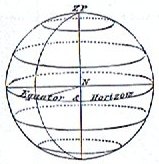

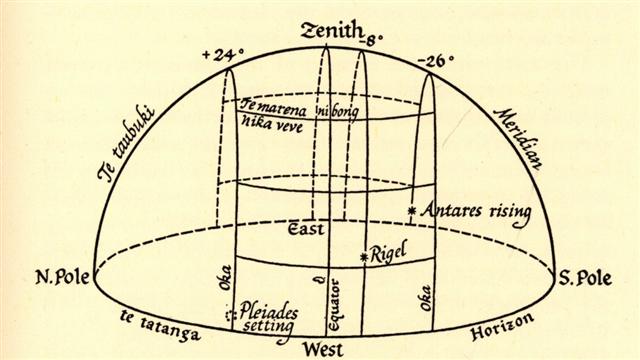
|










